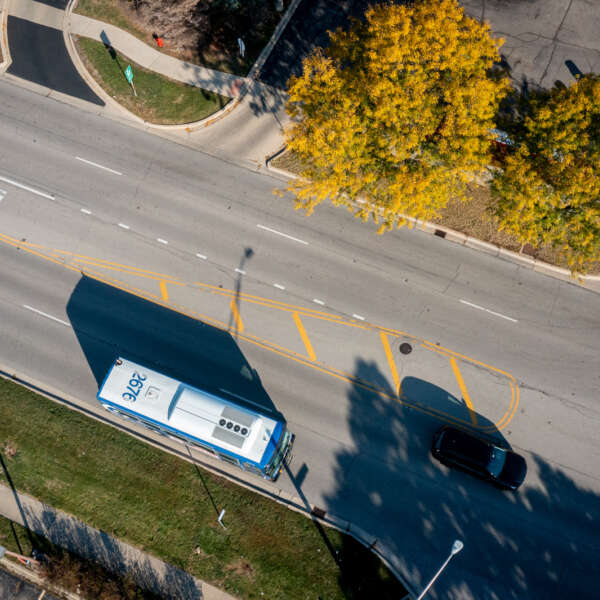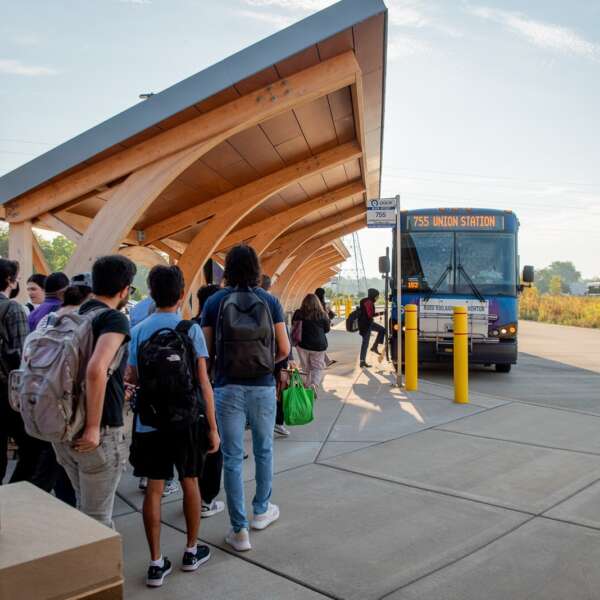Join the RTA Transit is the Answer Coalition to discuss possible reforms to improve service and accountability for riders
July 15, 2024
July 15, 2024

Following the introduction of legislation that proposes changes to how the Chicago region’s transit agencies are organized, the RTA continues to lead conversations about the future of transit funding and governance with the Service Boards, state legislators, and the public. Potential reforms to improve service and accountability for riders will be the subject of the next Transit is the Answer Coalition meeting to be held virtually on Wednesday, July 31. All are welcome but registration is required to attend.
The RTA projects the regional transit system is facing a $730 million annual operating shortfall starting in 2026, when federal COVID relief funds will run out. This gap is the result of chronic underfunding of transit operations in Illinois and the growth of remote and hybrid work post-pandemic.
To highlight the value of transit and gather input on funding and reform ideas, Senate Transportation Committee Chair Sen. Ram Villivalam scheduled a series of six subject matter hearings to be held over the summer to continue the conversation about the future of public transit in the Chicago region. The first hearing was held in Chicago on July 9 and included testimony from RTA Board Chairman Kirk Dillard, CTA President Dorval R. Carter Jr., Metra CEO Jim Derwinski, and Pace CEO Melinda Metzger.
The hearings come after State Representative Kam Buckner (D – Chicago) introduced HB5823, the Metropolitan Mobility Authority (MMA) Act, in April 2024. The legislation proposes the consolidation of CTA, Metra, Pace, and RTA into a new transit authority, the MMA. This proposed restructuring of transit governance is one part of the broader Clean and Equitable Transportation Act (HB5829/SB3936), which is sponsored by Rep. Eva-Dina Delgado (D – Chicago) and State Senator Ram Villivalam (D – Chicago).
While the legislation was supported by transit and environmental advocates and civic groups, the RTA does not support the MMA. The MMA proposal does not advance the critical funding need the RTA believes is paramount to conversations about the future of transit.
The MMA bill was not the first to suggest a change to transit governance recently. The Chicago Metropolitan Agency for Planning (CMAP) issued a report in late 2023, the Plan of Action for Regional Transit (PART), which outlines two possible options for transit governance. One envisions integrating the RTA and the Service Boards into one regional entity, and the other envisions an empowered regional coordinating agency with more autonomy and oversight. This coalition meeting will focus on what implementation of the second option could look like, which has been a focus of RTA’s ongoing discussion with legislators and stakeholders across the region.
As the fiscal cliff approaches, the RTA is advocating for sustainable funding and meaningful reform this fiscal year. We recognize any new investment must come with assurances that service will improve for all riders in the city and suburbs. The RTA is working with the Service Boards to build consensus on potential reform and accountability measures. These ideas emerged from discussion with legislators, advocates, and riders through the development and implementation of our strategic plan, Transit is the Answer.
Join the RTA Transit is the Answer Coalition on July 31 for a conversation about the following reforms. We want to hear from you as we shape this conversation going forward. Potential reform ideas to be discussed include:
Reform: RTA will work with stakeholders to define Regional Service Standards for minimum levels of service for each mode of travel to ensure a basic level of access to transit for residents. Operating agencies will be required to testify quarterly to the RTA Board on how they are meeting these standards and answer questions from the regional board.
Reform: RTA will set a vision for Regional Fare Policy and provide Service Boards with guidance early in the annual budget process. All fare-setting policies or changes are required to be reviewed and approved by supermajority vote at the RTA Board. This reform requires removal of the recovery ratio requirement and other changes to lower costs for frequent riders, including advancing a region-wide discounted fare program for riders experiencing low incomes and regional fare capping to ensure pay-as-you-go riders never pay more than the cost of a daily, weekly, or monthly pass.
Reform: RTA will lead Capital Project Prioritization to ensure greater regional engagement in decision-making and project selection. RTA will lead federal and state grant applications for key capital projects that have a significant regional scope and benefit.
Ideas in these areas and others are still developing. During the coalition meeting and beyond, we look forward to continued discussions with legislators, advocates, and riders who are so vital to the future of our system. Together we can chart a sustainable path forward for the system that increases access and improves reliability for all the region’s residents. Register to attend the coalition meeting.
Subscribe to our Newsletter
Related Articles
 Coalition members provide feedback on ‘Transforming Transit,’ RTA’s vision for improved service and accountability
Coalition members provide feedback on ‘Transforming Transit,’ RTA’s vision for improved service and accountability
Nearly 200 riders, advocates, and other stakeholders met virtually with the RTA on February 11 for the sixth quarterly Transit is the Answer Coalition meetin...
February 20, 2025 Far South Halsted Corridor Study prepares for future Pace Pulse service
Far South Halsted Corridor Study prepares for future Pace Pulse service
An RTA Community Planning project kicked off in late 2023 as a crucial step in bringing Pace Pulse service to Chicago’s south suburbs. The Far South Halsted ...
February 19, 2025 RTA proposes reforms to prioritize capital projects, maximizing impact of funding
RTA proposes reforms to prioritize capital projects, maximizing impact of funding
RTA is proposing a historic restructuring of the region’s transit governance to maximize the impact of new operating funding and ensure all riders experience...
February 5, 2025 RTA proposes reforms to integrate fares, require accountability for faster and more reliable transit
RTA proposes reforms to integrate fares, require accountability for faster and more reliable transit
RTA is proposing a historic restructuring of the region’s transit governance to maximize the impact of any new operating funding and ensure all riders experi...
February 5, 2025 For the third year in a row, regional transit ridership was up by double-digits in 2024
For the third year in a row, regional transit ridership was up by double-digits in 2024
Ridership across the Chicago region’s transit system continued to increase throughout 2024, according to the latest data from CTA, Metra, and Pace. The regio...
January 28, 2025 RTA is seeking $1.5 billion in annual operating funding. What would that mean for your commute?
RTA is seeking $1.5 billion in annual operating funding. What would that mean for your commute?
On January 15, RTA released Transforming Transit, a vision for the regional transit system with $1.5 billion in annual operating funding supported by a stron...
January 28, 2025